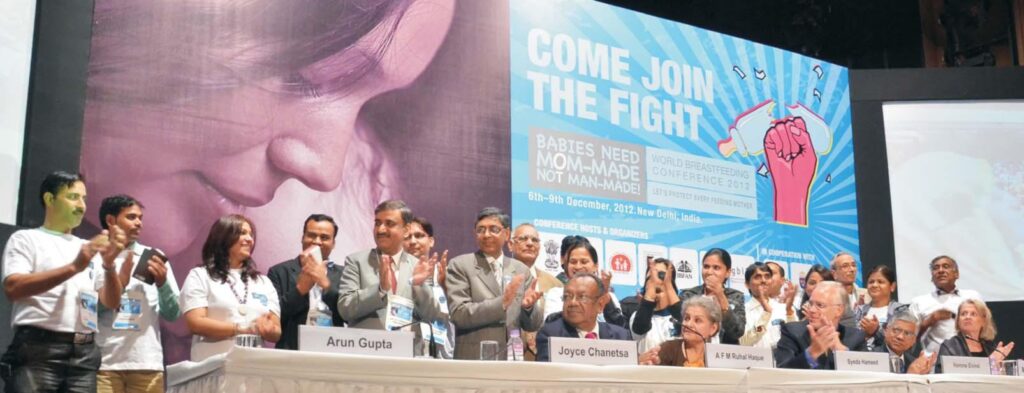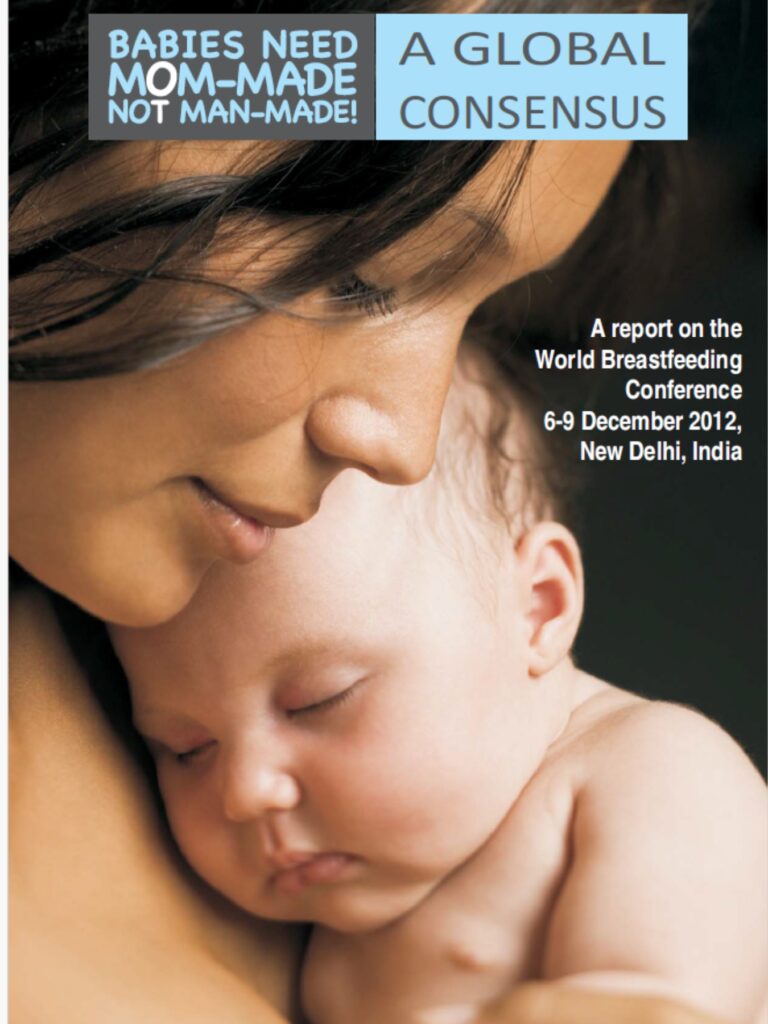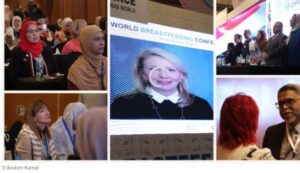UNICEF Executive Director Catherine Russell delivered an opening speech via video at...
Read More1st World Breastfeeding Conference (WBC1)
"Babies Need Mom-Made: Not Man-Made!”
6th – 9th December, 2012 | New Delhi, India

About the Conference
Lack of policy on breastfeeding and infant and young child feeding, lack of adequate budgets for implementing it where policy may exist, inadequate maternity protection, and the infant food industry’s influence in the market as well as on policy makers, governments, international NGOs, and donor agencies are a great hindrance to optimal infant feeding practices all over the world.
The World Breastfeeding Conference (WBC), which was organized as part of the five-year Strategic Plan of the Global Breastfeeding Initiative for Child Survival (gBICS), made a collective effort to address these challenges. The conference, which was organized with no conflict of interest in the form of support from industry, also proposed to release a report on the situation of infant feeding policies and practices in at least 51 countries that completed the assessment using IBFAN’s World Breastfeeding Trends Initiative (WBTi) tool. The proposal drew global support.
The Government of India, the Norwegian Agency for Development Cooperation (Norad), and the Swedish International Development Cooperation Agency (Sida) supported the World Breastfeeding Conference 2012, held in New Delhi from 6th to 9th December. UKAid and AusAID, through the South Asian Food and Nutrition Security Initiative (SAFANSI) Trust Fund routed through the World Bank, the Marcia Brady Tucker Foundation and Save the Children India co-sponsored it. UNICEF, USAID and WHO provided assistance through technical support in the concept and content, as well as in bringing in participants from various countries that have programmes supported by them.
For the first time in history, a World Conference on Breastfeeding took place, thereby raising the issue to a more prominent level. India, leading the fight in the Asian scene, hosted the conference with pride.
The conference facilitated open interaction among people and groups (at regional and thematic sessions). It was a platform to discuss with UN agencies, governments, people and groups from all over the world and the local people, on an equal basis, to share their thinking, pose open questions, and demand action from policy makers. Passionate presentations backed by equally substantial evidence inspired participants to come together to learn from each other’s experiences, collectively address issues and find solutions.
Various networks and groups working on infant feeding at national, regional and international levels strengthened their bonds and tightened their resolve to fight the menace of commercial interests that are undermining optimal infant feeding practices and influencing policy and programmes in many countries around the world.
The three-day conference carried a very tight schedule of plenary sessions, panel discussions, concurrent technical sessions and interactive sessions covering a wide range of topics as set out in the programme schedule. This report will briefly present the key messages from these sessions.
The 2012 World Breastfeeding Conference
Declaration and Call to Action
Babies Need Mom-Made, Not Man-Made!
9 December 2012, New Delhi India
Almost 7 million children under five years of age die globally every year, mostly in poor countries and largely from preventable causes. Of these, two thirds die before their first birthday, mainly from pneumonia, diarrhoea and newborn infections. One third of all under-five deaths are due to undernutrition.
Breastfeeding is a public health imperative. There is no food more nutritious, locally produced, affordable and sustainable than breastmilk. Artificial feeding increases the risk not only of childhood infections, but also of non-communicable diseases (NCDs) such as diabetes, obesity, cardiovascular disease and cancers, which are assuming epidemic proportions. Yet, two out of three infants – 92 million of the 136 million born annually – are either artificially or mixed fed.
Initiating breastfeeding within the first hour of birth can reduce neonatal mortality by 20%. Shockingly, more than half the world’s newborns are not breastfed within an hour of birth. Globally, less than 40% of infants under six months are exclusively breastfed. Infants need continued breastfeeding along with adequate amounts of complementary foods after six months of age, and breastfeeding should continue for two years or beyond. Yet, only a minority of children are breastfed until the age of two.
Breastfeeding also has enormous benefits for maternal health and is an important factor in child spacing for the millions of women who have no access to modern forms of contraception.
Why breastfeeding rates remain low
Optimal breastfeeding and infant and young child feeding rates are low because:
Women lack support for breastfeeding and appropriate complementary feeding.
There is widespread ignorance and lack of awareness of their importance.
Baby food and feeding products industries continue to mislead parents and market products aggressively.
The commercial, for-profit sector and their front organisations are unduly influencing national and international decision-making processes, policies and programmes.
Glaring gaps exist in national policy and programmes, as documented by the World Breastfeeding Trends Initiative (WBTi) and others.
Ready-to-use or processed foods are being pushed to replace appropriate family foods after six months.
Broken commitments
Over the last four decades, the global community has failed to achieve its commitments to improve children’s health. The Alma Ata Declaration of Health for All by the Year 2000 has not been realised. The Convention on the Rights of the Child, endorsed by all but two countries, has not yet been fulfilled. Therefore, the Millennium Development Goals to significantly reduce poverty and maternal and child mortality by 2015 have been largely unmet.
The First World Breastfeeding Conference
At the First World Breastfeeding Conference 2012, participants from 83 countries – representing governments, breastfeeding organisations, health providers, people’s organisations and movements, international NGOs and individuals – expressed deep concern at the continuing inequality in health and nutrition, and the subjugation of these concerns to corporate business objectives.
We recognise that the protection, promotion and support of breastfeeding, and optimal infant and young child feeding, is a human rights issue. It must be entrenched in public policy and programmes as a necessary condition requiring resources.
Call to Action
We call upon all concerned to take the following actions:
Adopt a human rights-based approach to the protection, promotion and support of breastfeeding and infant and young child feeding at international, national, subnational and community levels.
Establish institutional mechanisms to avoid and manage conflicts of interest in health and nutrition decision-making and programme implementation.
Support all women with a comprehensive system of maternity protection at work, including in the non-formal sector, with appropriate financing.
Ensure adequate education and training for all health care professionals, allied health workers and community workers, both pre-service and in-service, across all sectors, to counter widespread ignorance.
Establish clear budget lines for breastfeeding and infant and young child feeding policy and programme interventions, to ensure sufficient human and financial resources to enhance optimal practices.
Invest in the Baby-Friendly Hospital Initiative, including mother-friendly practices, and link it to community initiatives. This should be rooted in all maternal and neonatal health programmes, with due attention to low birthweight babies.
Widely publicise the multiple risks of artificial feeding, bottles and teats, as well as early complementary feeding, through all kinds of media campaigns.
Ensure universal access to accurate information and counselling on breastfeeding and infant and young child feeding for all mothers. Provide skilled counsellors in health facilities and in the community, available for any situation.
Monitor and track the Global Strategy for Infant and Young Child Feeding in every country using the World Breastfeeding Trends Initiative (WBTi) and advocate to bridge the gaps.
Protect breastfeeding from commercial sector influence by strictly enforcing the International Code of Marketing of Breastmilk Substitutes and subsequent World Health Assembly Resolutions, and prohibit all promotion of commercial foods for children under two years of age or beyond.
Promote the use of affordable, diverse, locally grown, indigenous foods for timely and appropriate complementary feeding after six months, along with continued breastfeeding.
Enhance and support breastfeeding-related research with public funding.



